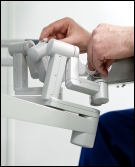Source: www.privatehealth.co.uk
Author: staff
Pioneering surgery which allows doctors to remove cancer in the mouth using a minimally invasive technique is now available at the Wellington Hospital.
Traditionally, the only way to remove Squamous Cell Carcinoma – cancer of the oropharynx which encompasses the tonsils and base of the tongue – has been to split the jaw, take out the cancer and repair the neck with tissue from the forearm.
This 10-hour procedure requires two surgical teams and often has complications. Patients are in hospital for at least three weeks and need months of rehabilitation to help them swallow and speak again.
Because the treatment is so invasive, many doctors try to avoid it using chemotherapy and radiotherapy instead. However, surgery is often the best chance of a cure.
The new one-hour technique called Transoral Robotic Surgery allows the cancer to be removed without splitting the jaw or taking tissue from other parts of the body. Instead, the tonsils are accessed through the mouth using a specially designed robotic machine.
Developed in the US in 2009 and now approved by the American Food and Drug Administration and licensed for use in the UK, it uses the Da Vinci robot to access this difficult to reach area.
It gives the surgeon greater precision, dexterity and accuracy while carrying out the procedure and the patient has no stitches. Infection rates are reduced which speeds up recovery rates, patients are in hospital for just a week and are able to swallow normally soon afterwards and require no long-term feeding tubes.
Neil Tolley, a Consultant Head and Neck Surgeon at the Wellington Hospital, who is now carrying out the new technique, says: “The mouth is a small place. The da Vinci robot allows access to anatomical sites and permits surgery to be performed which would otherwise be technically very difficult or impossible to perform conventionally.
“On the patients treated so far, the swallowing outcomes have been excellent with no need for a gastrostomy tube to feed them, yet the same cure rates have been achieved.”


Leave A Comment
You must be logged in to post a comment.